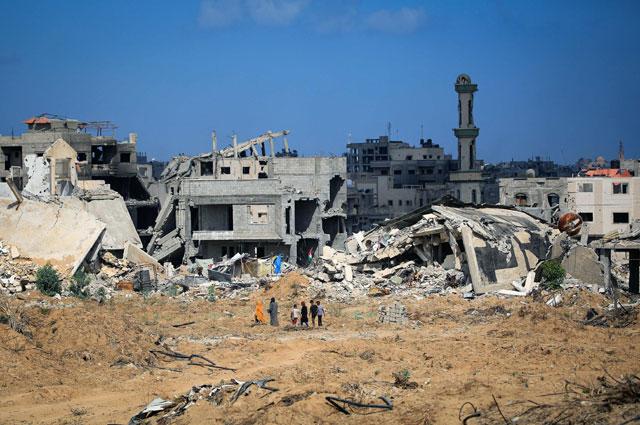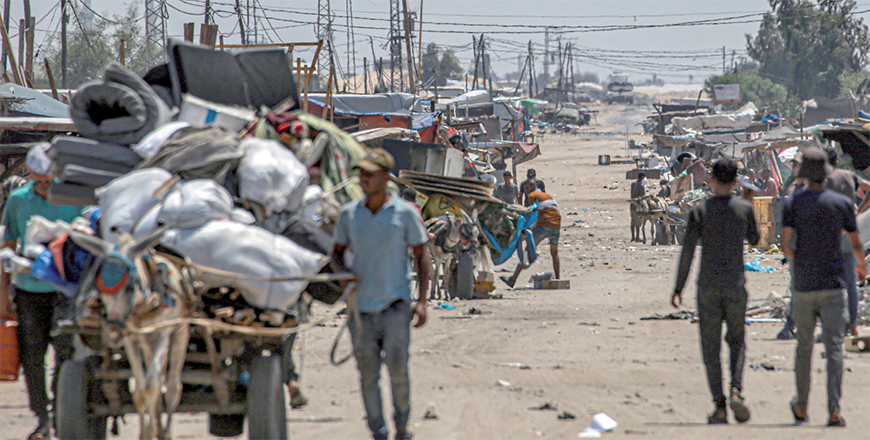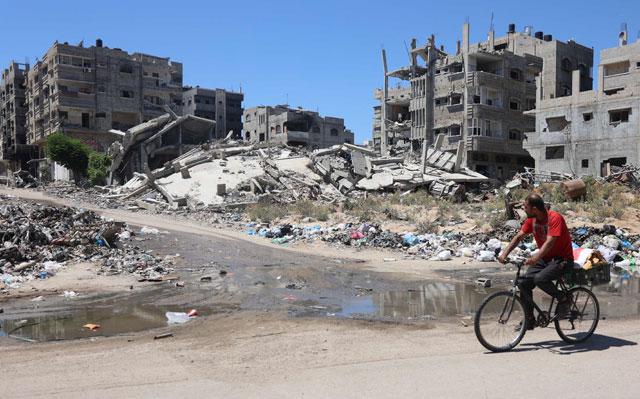You are here
Fighting rages in Gaza City's Shujaiya for fourth day
By AFP - Jul 01,2024 - Last updated at Jul 01,2024

Palestinian women and youth walk past buildings destroyed in the Israeli bombardment, as some residents return to the city of Khan Yunis, in the southern Gaza Strip on Sunday (AFP photo)
GAZA STRIP, Palestinian Territories — Heavy battles and bombardment hit Gaza City's Shujaiya district for a fourth day on Sunday, months after the Israeli army declared Hamas's command structure dismantled in the northern area.
Tens of thousands of Palestinians have fled the devastated neighbourhood, where the army said it has fought Hamas and Islamic Jihad fighters both "above and below ground" in tunnels.
The military said troops had "eliminated several terrorists, located weapons and conducted targeted raids on booby-trapped combat compounds" over the past 24 hours while the air force had "struck dozens" of the fighters' infrastructure sites.
It also reported clashes in central Gaza and the southern Rafah area, a week after prime minister Benjamin Netanyahu declared that the “intense phase” of the war raging since October 7 was nearing an end.
The United Nations humanitarian agency OCHA estimated that “60,000 to 80,000 people were displaced” from Shujaiya since new fighting broke out there on Thursday and the army issued evacuation orders.
Months of on-and-off talks towards a Gaza truce and hostage release deal have meanwhile made little progress, with Hamas saying on Saturday there was “nothing new” in a revised plan presented by US mediators.
United States President Joe Biden late last month outlined what he called an Israeli plan for a six-week truce and exchange of some hostages for Palestinian prisoners held in Israel.
Washington last week presented “new language” for parts of the proposed deal, according to US news site Axios.
A Hamas official in Lebanon, Osama Hamdan, confirmed that the Islamist movement had received the latest proposal but said it presented “no real progress in the negotiations to stop the aggression”.
Hamdan labelled the proposals “a waste of time” that aimed to give “additional time for the occupation [Israel] to practise genocide”.
‘Everything is rubble’
The war started with Hamas’ October 7 attack on southern Israel which resulted in the deaths of 1,195 people.
Israel’s retaliatory offensive has killed at least 37,877 people, also mostly civilians, according to data from the health ministry in Hamas-run Gaza.
Six more people were killed in an air strike at dawn targeting a family house in Rafah, said medics at Nasser Hospital where the bodies were taken.
Artillery shelling also struck southern areas of Rafah city, witnesses said.
United Nations and other relief agencies have voiced alarm over the dire humanitarian crisis and threat of starvation the war and Israeli siege have brought for Gaza’s 2.4 million people.
“It’s really unbearable,” said Louise Wateridge from UNRWA, the UN agency supporting Palestinian refugees, speaking Friday after returning to the city of Khan Yunis.
“Everything is rubble,” she said. “And yet people are living there again... There’s no water there, there’s no sanitation, there’s no food. And now, people are living back in these buildings that are empty shells.”
In Israel, thousands of protesters again took to the streets of Tel Aviv on Saturday night, demanding greater efforts to return the remaining captives, and calling for early elections.
Former hostage Noa Argamani, 26, who was rescued in a special forces raid on June 8, said in a video address that “we can’t forget about the hostages who are still in Hamas captivity, and we must do everything possible to bring them back home”.
‘An obliterating war’
The Gaza conflict has also led to soaring tensions on Israel’s northern border with Lebanon, where the army has traded cross-border fire with the Hezbollah movement since October.
Hezbollah is part of the “axis of resistance” of Iran-backed armed groups against Israel and its Western allies. The grouping also includes militants in Iraq and Yemen’s Houthi rebels.
Israel’s military said this month that its plans for a Lebanon offensive had been “approved and validated”, prompting Hezbollah to respond that no part of Israel would be spared in a full-blown conflict.
Iran’s mission to the UN, on social media Saturday, said it “deems as psychological warfare the Zionist regime’s propaganda about intending to attack Lebanon”.
It also warned its arch foe that, “should it embark on full-scale military aggression, an obliterating war will ensue”.
“All options, incl. the full involvement of all Resistance Fronts, are on the table.”
Iran, which backs Hamas, has praised the October 7 attack as a success but has denied any involvement.
Related Articles
GAZA STRIP, Palestinian Territories — Explosions, air strikes and gunfire rattled northern Gaza on Saturday, the third day of an Israeli mil
GAZA STRIP — Israel bombed the Gaza Strip where one hospital reported at least 30 dead on Friday and as exchanges of fire and threats over t
GAZA STRIP, Palestinian Territories — Israeli forces bombed and battled Hamas in Gaza City on Wednesday as tens of thousands of Palestinians


















